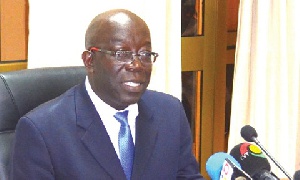The Social Security and National Insurance Trust (SSNIT) is to claim refunds of over $25 million ($25,225,635.05) from IT solution providers and software vendors.
The amount includes $15.2 million ($15,281,167.87) and GH¢16 million (GH¢16,019,579.46) to be claimed from an IT solutions provider.
In addition, the Trust will also retrieve $6.9 million ($6,944,467.18) from a software provider.
Dr John Ofori-Tenkorang, the Director-General (DG) of SSNIT, announced this at a media briefing in Accra.
According to him, a newly signed three-year Service Level Agreement (SLA) is saving the Trust $2 million.
Internal Audit of ICT systems
He stated that management of SSNIT embarked on a comprehensive audit of the Trust’s ICT systems and identified several areas in which the Trust could recover certain costs and also cut down on recurrent support and maintenance expenditure.
This, he said, led to a renegotiation of agreements on some ICT infrastructure, support and license fees, resulting in the savings of $8.52 million to the Trust.
Investments
He explained that SSNIT’s investments registered a 5.77% real return in 2017 as against a -5.93% in 2016. This was an improvement on the target of 3.25%.
SSNIT’s total investments as at September 2018 were GH¢9.38 billion.
This represents a growth of 2.4% in asset value compared to the September 2017 value of GH¢9.16 billion and an increase of 1.4% compared to the December 2017 value of GH¢9.25 billion.
Foreign travels
Dr Ofori-Tenkorang said as a result of significant reduction in foreign travels for the period ended September 30, 2018 was 1.57 million, as against a budgeted amount of GH¢8.34 million. A positive variance of 81%.
In similar vein, the total expenditure on travel and accommodation was drastically reduced to GH¢1.9 million in 2017.
This contrasts favourably with the GH¢8.3 million, which was spent in 2016, representing a 77% reduction in expenditure.
This follows the decision to amend the Trust’s travel policy so that all employees, including the Director-General, fly Economy Class for trips, which will not last longer than four hours.
He revealed that in the period between March 2017 and September 2018, it has managed to correct the deficit of 2016 and arrest the fast deteriorating finances of the Trust.
The Director-General said in 2016, for the first time since the creation of the Trust, it was paying out more than it was collecting. This forced the board to institute measures to correct this deficit.
The Marketing Department at the Office of Corporate Affairs has been tasked to intensify marketing activities to sell off real estate housing as and when they are completed without waiting for the total completion of the projects. SSNIT is also reviewing its investment guidelines, in line with the new asset allocation policy and emerging trends.
It has also improved on its corporate governance by appointing professionals and experts to the boards of its subsidiary companies. This, for the first time, has led to the declaration of dividend by The Trust Hospital Company Limited since its incorporation in 2010.
The amount declared was GH¢597,979. Another investee company, Labadi Beach Hotel, also declared a dividend of GH¢1 million for 2017. This contrasts with the loss which the hotel registered in 2016.
SSNIT’s Treasury Policy has been revised and the Trust now places funds with commercial banks and other financial institutions at Treasury bill rates, plus a minimum of 3%.
In the past, SSNIT funds had been invested in Treasury bills plus 1%. Under the new policy, however, some funds have been invested at Treasury bill rates plus 5.3%, with security cover.
At the end of 2017, the value of SSNIT’s cash and near-cash instruments stood at about GH¢1 billion, as opposed to GH¢217 million at the end of 2016.
The value of the Trust’s assets increased by GH¢1.376 billion in 2017 from GH¢8.4 billion to GH¢9.776 billion, as against a decrease of GH¢404.481 million in 2016.
The Trust is also on track to complete about 1,072 affordable housing units at Asokore Mampong by December 2018 within budget, with 1,464 affordable housing units at Borteyman, completed and up for sale.
Deletion of ghost names
To curb the rate of increase in benefits payments, the management of SSNIT decided to embark on an exercise to sniff out and delete ghost names from the payroll.
This led to the deletion of a total of 6,452 “pensioners” from the payroll and has led to savings of over GH¢20,000,000 as at September 2018. This has trimmed the Trust’s monthly benefits payments by GH¢2,700,000.
Larger pool of contributors
To ensure that the Trust rakes in more than it pays out, the management took a decision to start a new programme to register contributors.
A total of 209,551 people were registered onto the scheme as of September 2018, representing an increase of 17.4% over the number of new registrants in 2017.
In 2017, enrolment numbers onto the scheme increased by 200,000 - an increase of about 14% over the performance in 2016.
Dr Ofori-Tenkorang also noted that compared to other state institutions like the Registrar General’s Development (RGD), it had very few organisations registered on its roll. Whereas the Registrar General’s Department has over 250,000 registered organisations, SSNIT only has about 66,000 establishments on its roll.
It is, therefore, collaborating with the RGD and the Ghana Revenue Authority (GRA) to synchronise their databases to get all active registered organisations on board.
The trust is also collaborating with the National Identification Authority to leverage on their platform to reduce the cost of producing new membership cards.
Contributions collection, which had decreased from GH¢1,767,000 in 2015 to GH¢1,544,000 in 2016 (a decrease of 12.6%), saw a marked improvement in 2017, with the Trust managing to collect an amount GH¢1,947,000 in contributions, an increase of 26.1% over the 2017 amount.
An amount of $15,281,167.87 and GH¢16,019,579.46 are also to be as refunds from one of the IT solution vendors.
The retooled internal audit department has also discovered a further $6,944,467.18 to be claimed from a software provider.
Value-for-money audits
Management is conducting a value-for-money audit on several of the Trust’s ongoing real estate construction projects, which results will serve as the basis for the renegotiation of any contracts they may deem necessary.
These steps are part of the board’s unwavering commitment to build a Trust whose existence and success is not only based on the law, but on an unequivocal track record.
Business News of Tuesday, 4 December 2018
Source: thefinderonline.com

















